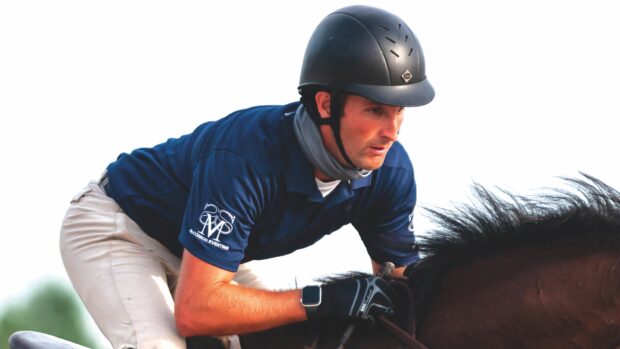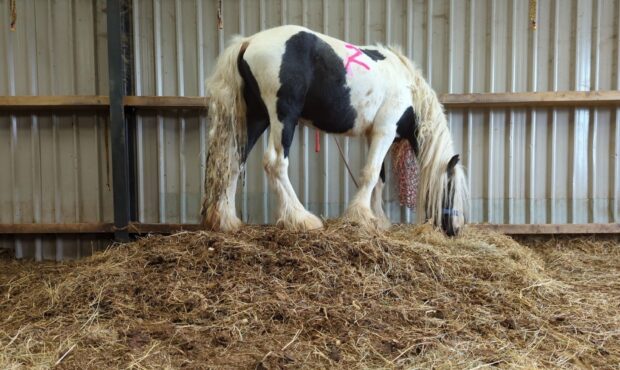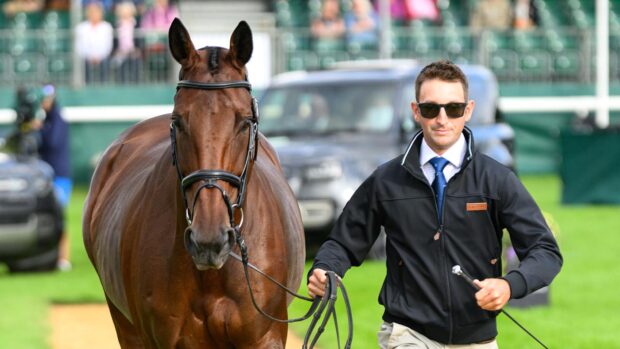Ponies who died in a national park after they were put there for conservation grazing were “failed three times over”, the rider who found them believes.
Anita Buxton told H&H she warned Pembrokeshire Coast National Park Authority that Wern Common in Mynachlogddu was unsuitable for ponies who were not used to such environments, and would not sustain them over the winter.
But the ponies remained, and last February, Anita found one carcass in a bog and another in “the only shelter on the land”. She said the surviving ponies were in poor condition.
“Everyone else seems to have forgotten about it, these poor animals, but I couldn’t,” she said.
“The poor pony in the bog – it must have taken days to die. There were piles of droppings, and everything around it had been eaten down to the roots. These were domestic ponies and they didn’t know how to survive in that environment.”
Anita explained that various people have grazing rights for different animals on different parts of land in the area.
“The graziers keep an eye on their stock,” she said. “The national park has its conservation grazing agenda.”
Anita said the land on which these ponies were found had a bridleway that had recently been cleared, and that she told the park authority in 2021 it would not support ponies through winter owing to the poor quality of the grazing.
“It was open when I had a call from the national park saying they were going to put two yearling fillies on the land for conservation grazing,” she said. “I said there were wild ponies nearby, why didn’t they just leave the gate open; they’re used to living on the mountain and keeping themselves safe, but that was poo-pooed.”
Warning: video includes upsetting scenes
Anita said she did not use the bridleway all the summer of 2022 as she had been told yearlings would be on it, but found the following February that only two ponies were there.
“I filmed it all on my GoPro,” she said. “It was pretty horrific. The other two were emaciated and covered in rain scald, [almost] dead on their feet.
“The others had been dead for a while, no one can have been checking on them.”
Anita reported the incident to the RSPCA and the park authority. Her initial calls were on a Friday morning, and she said that early on the Monday, the bodies and survivors were moved.
“The carcass had been pulled out of the bog so by the time the RSPCA man arrived, there were only a few bones,” she said. “The one that died in the bog was only about 18 months old, by its teeth, which really upset me. The other one was behind a couple of big conifers, the only bit of shelter; I think it has just keeled over from the cold and malnutrition.”
Anita said last summer, when she found out there would be no prosecution, she appealed, but to no avail.
“Everything’s been covered up and swept under the carpet,” she said.
“These poor ponies were plonked and fenced into an alien and inhospitable environment. A lady who lives nearby said she heard neighing for a couple of days; the poor thing must have been trapped and calling for help.
“They’d stripped the bark off the trees; there was nothing for them to eat and nowhere they could go. There’s a real issue of animals being put in dangerous places to tick the conservation grazing box.
“The park authority didn’t manage them or follow them up, the owner should have been responsible for looking after them and the RSPCA didn’t act; those animals were failed three times.”
A Pembrokeshire Coast National Park Authority spokesman told H&H the authority has a long history of working with graziers, and that the grazing schemes “play an important role in nature recovery”.
“Through these schemes, the authority supports the connection between landowners who offer land for grazing opportunities and those who wish to use the land for grazing animals,” he said. “The authority facilitates the initial arrangement, but the welfare of the grazing animals is the responsibility of their owner.
“In the case of Wern Common, a site of special scientific interest, the authority secured the agreement for the grazing during the summer months and as part of this initial arrangement, requested that the animals be moved prior to winter, to ensure their welfare on land that was not suitable for winter grazing.
“The ponies were not moved from the land prior to winter, as agreed, and despite repeated assurances from the owner that their removal was imminent, the ponies remained on site.
“Despite the ponies being the responsibility of owners, due to the tragic loss of two animals and further concern for the remaining ponies on site, on the advice of animal health professionals the authority took the decision to assist the owner to remove the ponies in the interests of public safety and the risks posed on a publicly accessible footpath.”
The RSPCA told H&H: “We are so grateful to people who report suspected animal suffering to us and we would like to reassure people we will always look into and, if necessary, investigate any complaints made to us about animal welfare.
“Unfortunately we are unable to discuss complaints about specific people and what action may have been taken. We understand how frustrating that is for animal lovers but releasing information could prejudice a future investigation or could lead to us being fined.
“We understand it may be disappointing if a prosecution is not taken forward, however we have robust procedures in place, using the same test as the Crown Prosecution Service. Whether or not to prosecute, is decided on a case by case basis by our independent prosecutions team based on the evidence and whether or not it is in the public interest.
“We rely on vets to provide expert opinions of whether or not an animal has suffered, and we have to respect their professional view.”
You might also be interested in:

Concern over ‘rewilding’ project ponies’ welfare *H&H Plus*

Subscribe to Horse & Hound magazine today – and enjoy unlimited website access all year round
Horse & Hound magazine, out every Thursday, is packed with all the latest news and reports, as well as interviews, specials, nostalgia, vet and training advice. Find how you can enjoy the magazine delivered to your door every week, plus options to upgrade your subscription to access our online service that brings you breaking news and reports as well as other benefits.




